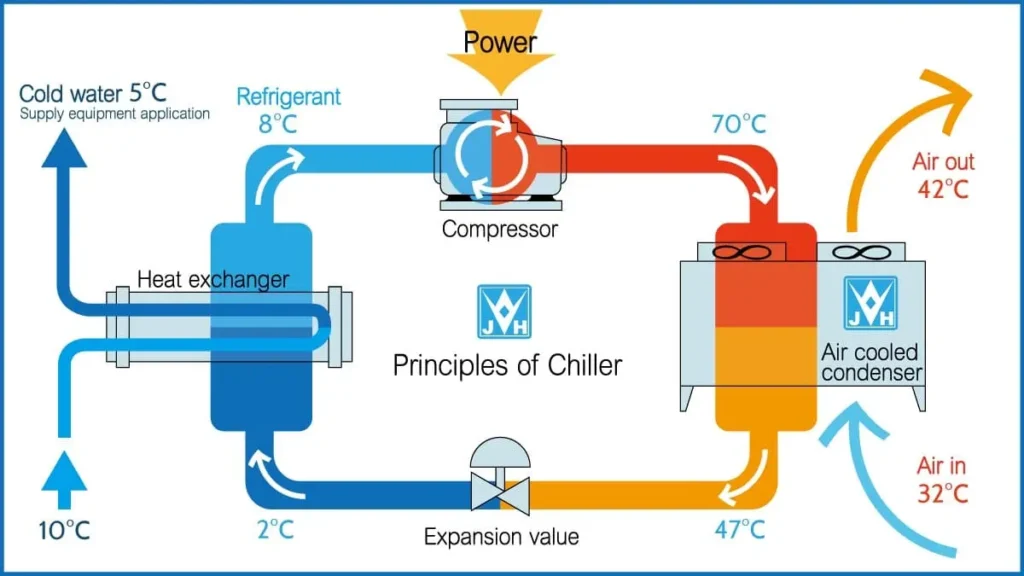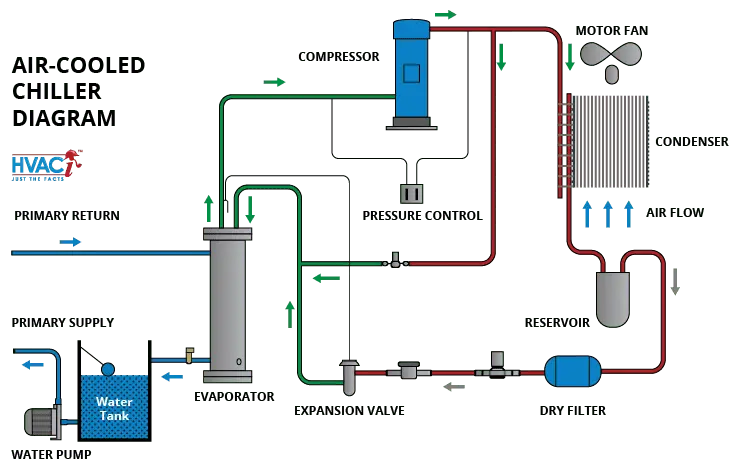Is a Chiller Part of an HVAC System?
Table of Contents
ToggleYes, a chiller is part of an HVAC system.
Chillers are in HVAC systems because they help keep places cool. HVAC systems aim to make indoor spaces comfortable by managing temperature and humidity.
Chillers are like the cooling heroes, as they remove heat and provide cool air or water. They work together with other HVAC parts, each with its specific job. So, in the HVAC world, chillers are the cool cats that ensure places stay comfortably chilly when needed.
What Is a Chiller?
Chiller in Cooling Systems
A chiller is a mechanical device designed to cool or lower the temperature of a fluid, typically water or a water-based solution. It is crucial in maintaining the desired temperature within various systems, including air conditioning and industrial processes. Chillers are commonly used in HVAC systems, as well as in industrial settings, to remove heat from a space or process.
How Do Chillers Work?
Chillers work on the principle of heat exchange. They absorb heat from a fluid (usually water or a refrigerant) and then transfer it to the environment, effectively cooling the fluid.
This is achieved through a refrigeration cycle involving a refrigerant’s compression, condensation, expansion, and evaporation. The cooled fluid is then circulated through a system to remove excess heat, contributing to the overall cooling process.
Role of Chillers in HVAC Systems
In an HVAC (Heating, Ventilation, and Air Conditioning) system, chillers are responsible for the cooling aspect. They play a central role in maintaining comfortable indoor temperatures by cooling the air circulated throughout a building.
Chillers are often used in conjunction with air handling units and ductwork. They help regulate temperature and humidity, ensuring a pleasant indoor environment.
Key functions of a chiller in cooling and air conditioning
Chillers contribute to air conditioning and cooling by removing heat from the building’s air and transferring it to an external environment.
They provide the chilled water that circulates through the air conditioning system, allowing air handlers to distribute cool air.
Chillers are also essential for maintaining precise temperature control, making them indispensable in data centers, hospitals, and other environments where temperature stability is critical.
Common HVAC Components
HVAC systems consist of several components, including:
- Furnace: Heats air for distribution.
- Air Handler: Moves and conditions air, typically through filters and coils.
- Ductwork: Distributes conditioned air throughout the building.
- Thermostats: Control the temperature settings.
- Ventilation systems: Exchange indoor and outdoor air.
- Heat pumps: Provide both heating and cooling functions.
- Filters: Remove impurities from the air.
Read Also: Is a Boiler Part of the Home HVAC System
Comparison of chillers to other components:
While chillers are primarily responsible for cooling, other HVAC components handle different aspects of temperature regulation. For example, furnaces are used for heating, and air handlers circulate and condition the air.
Ductwork plays a crucial role in air distribution, and thermostats control the settings. Chillers are unique in their ability to maintain cool temperatures, making them essential for controlling indoor comfort in warm climates and critical for various industrial processes.
Benefits of Including a Chiller in Your HVAC System
Including a chiller in your HVAC system brings several advantages:
- Energy Efficiency: Chillers use less energy, leading to cost savings.
- Precise Control: They offer accurate temperature and humidity control.
- Longevity: Chillers are durable and have a long lifespan.
- Environmental Friendliness: Many chillers use eco-friendly refrigerants.
- Versatility: They suit a wide range of applications.
- Reduced Noise: Chillers located outdoors minimize indoor noise.
- Cost Savings: Long-term benefits often outweigh the initial investment.
FAQs
is the chiller and condenser the same?
the chiller and condenser are not the same. A chiller is a cooling system, while a condenser is a component within some cooling systems.
is a chiller a heat exchanger?
a chiller is a type of heat exchanger used to remove heat from a liquid or air.




